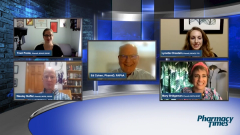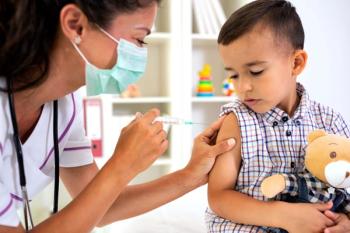
Coping With Burnout and Stress in Community Pharmacies
The panel of experts share personal experiences with burnout in the pharmacy setting and outline opportunities for improving the atmosphere of the workplace.
Episodes in this series

Ed Cohen, PharmD, FAPhA: Over the past 2 years, we have seen and heard so much conversation around it. We’re plain old tired. There’s a lot of angst, burnout, and stress, and there’s no end to the flow of patients. When the COVID-19 vaccine first launched, there was no end to patients at all. In your practice, what have you seen, experienced, developed, or implemented in your practice to help your staff to better prevent, treat, and cope with this burnout and stress? I encourage all of you to add something to this.
Wesley Nuffer, PharmD, BCPS, CDCES: Ed, I’m glad that you bring it up. This is a very important topic for us to continue to talk about. Community pharmacy is very rigorous and demanding. Working with graduates moving into that area, we’ve had first-year students who aren’t thriving question their whole career. That’s very sad and can be avoided. To answer to your question, I’ve experienced a number of great strategies. In some of the community settings, you can’t call and talk to a person about scheduling vaccinations for COVID-19. That was especially common at its peak. You had to schedule online. They didn’t let you talk to a pharmacy staff member or make exceptions, and it was all workflow related.
I’m working on a number of initiatives with community pharmacies around chronic disease management, and in the last 18 months, the message to me [has been], “We can’t do this, Wes. We’re barely able to walk out the door at the end of the day.” I feel compassionate about our community partners, [and] our pharmacists working so hard to be part of the solution. It’s a challenge, and there’s a lot of burnout and discontentment. We need to continue to figure out ways around this.
I’m pleased to see that in Colorado, most of the chain pharmacies close for lunch. That wasn’t a thing when I was in community pharmacy. You worked through your lunch. Even that small 30- or 60-minute window where you can stop answering phones, take a deep breath, and maybe stop vaccinating people during that time is very valuable. For policy, we need to continue to advocate for our profession. We need to make sure that when people are making decisions around things like pharmacists’ labor, that there’s a pharmacist at the table for that. Because it breaks my heart to hear that new students are disenchanted with the profession over what they’re seeing right now. We can avoid that, and we need to.
Mary Bridgeman, PharmD, BCPS, BCGP: I can reflect on my COVID-19 vaccine clinic experience and time throughout these past 2 years when we’ve been called to share our expertise as pharmacists and pharmacy immunizers. We hosted an interprofessional vaccine clinic with nursing students, nursing faculty, pharmacy students, and pharmacy faculty that accommodated appointments and walk-in individuals at our school of pharmacy. It was a tremendously successful, rewarding experience for our students, learners, patients, and community at the University and in the larger Central New Jersey community who were able to participate in this clinic event. I absolutely think it helped to combat that burnout and those experiences and to remind our students and aspiring health care professionals that this is a team sport, and we’re all in this together. It was a great experience for our students to learn from one another, learn about each other’s skill set, and even pick up some techniques and strategies from one another.
I was very privileged in my experience as part of this interprofessional clinic event. I realize that isn’t necessarily everyone’s experience, but it was a nice way to give back to our community and to support interprofessional collaboration.
Traci Poole, PharmD, BCACP, BCGP: We implemented a lot of workflow changes and initiatives, going back to what Wes was saying about appointments. We took on how to use technology to alleviate some of our burden. We’ve also been able to pull in a lot of the staff and give them additional roles, not just administering the vaccines but teaching them about billing, how to look for eligibility, answering questions from patients about getting a second vaccine at the same time, and to communicate to us when those questions are asked.
It has been very hard and taxing at times. In the past 2 years, my patience has probably been tested more than it had been my entire life up to that point with some of the conversations and things that happened. But to speak to what Mary said, there was such a sense of joy, especially when children 6 years old and up were able to get vaccinated. People were taking photos. They were so excited to be able to go outside again and be with their families.
There were very long days. I was 8 months pregnant when we started in-housing, and it made for some very long days. But the sheer joy of people so excited to be able to try to get back to life again has been very rewarding. I feel for some of my people who were there full time all day every day by themselves with 1 technician. We have to do something about that if we’re going to continue to make an impact. But most people could reflect on some of the good as well with the bad.
Lynette Chastain, PharmD, BCACP, TTS: Absolutely. To piggyback on what Traci said, it’s important to make sure that we’re passing those things on. So many patients tell me things about other providers or other pharmacists, and my intention is to share those things, but then the next minute I get back, something else happens. Taking a moment to say, “Hold on. I’m going to write that down,” or “I’m going to make sure I give that to that person and share those moments,” [is helpful] because we all love making that impact. Helping someone feel better and have better health is our goal. Taking those moments when you leave for the day and saying, “What was 1 thing that I can take away that I did well and that made a difference?” will bring you back to your purpose before you start the next day.
Transcript edited for clarity.
Newsletter
Stay informed on drug updates, treatment guidelines, and pharmacy practice trends—subscribe to Pharmacy Times for weekly clinical insights.







































